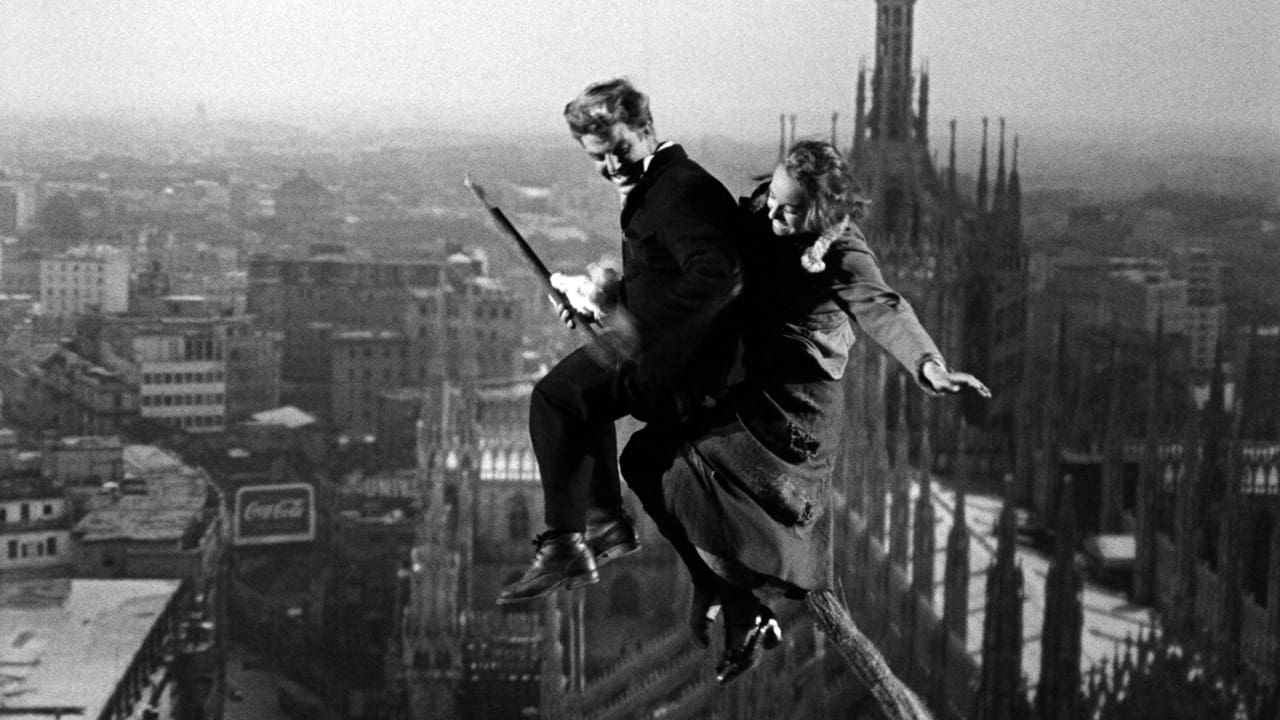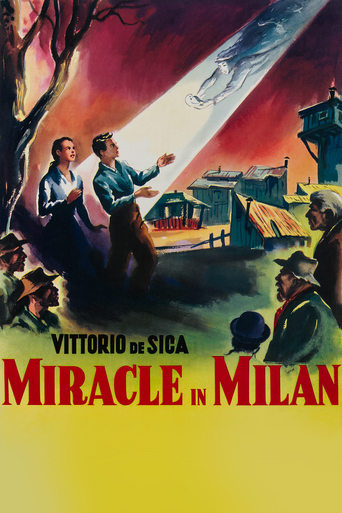Softwing
Most undeservingly overhyped movie of all time??
Claysaba
Excellent, Without a doubt!!
Chirphymium
It's entirely possible that sending the audience out feeling lousy was intentional
Celia
A great movie, one of the best of this year. There was a bit of confusion at one point in the plot, but nothing serious.
l_rawjalaurence
MIRACLE IN MILAN has a straightforward plot: young Toto (Francesco Golisano) is discovered in a cabbage patch by an old woman (Emma Gramatica) who brings him up as her son. She passes away, and the boy is sent to an orphanage. Released from the institution as an adolescent, Toto embraces a positive view of life; and becomes involved in a large-scale project to set up a shanty-town on the outskirts of Milan. They fall foul of the landowner Mobbi (Guglielmo Barnabò) who tries every possible means to evict them using the police force, water-cannon, bullets and the like. Toto and his friends resist them with the help of the miracle suggested by the title and end up going to a possibly happier world.Director Vittorio de Sica and his cinematographer G.R. Aldo capture the atmosphere of postwar Milan with its deserted streets, ruined buildings and outwardly cold population in the depths of winter. Horses and carts still run up and down the streets; cars are a rarity except among the filthy rich. Poverty is rife: many homeless people wander up and down ransacking the rubbish-heaps and making do with very little, even half-empty bottles of alcohol thrown to them from passing cars.The distinction between rich and poor is highly pronounced, as one might expect from Cesare Zavattini, who rote the novel on which the film is based, as well as collaborating with de Sica. Yet MIRACLE IN MILAN differs from other de Sica movies in its use of quasi- Brechtian devices - for example, street signs changed into multiplication sums for the benefit of the street children, or obvious signs denoting the symbolic meaning of the shanty-town. The musical numbers (by Alessandro Cicognini) attest to a bright future for the poor; not that they need much. They would be happy with just a crust of bread and a roof over their heads.Stylistically speaking the film has several antecedents, as well as the Italian neo-realist tradition. The sight of the shanty-town residents marching triumphantly down their streets singing about their dreams recalls British musicals such as SING AS WE GO (1934), as well as the better-known Depression-era Hollywood musicals like 42nd STREET (1933). The group ethic that binds Toto and his friends together has further British antecedents in PASSPORT TO PIMLICO (1949), another comedy set in the bomb-damaged wastes of a big city.MIRACLE IN MILAN is a highly entertaining piece with an upbeat ending, drawing our attention to community values as well as placing our trust in our families. There are some good jokes at the expense of the bourgeois Mobbi, including one where he and his co- conspirator are reduced to barking at one another like a pair of unruly dogs. De Sica's social criticisms are as applicable today as they were sixty-plus years ago; one can only hope that people experiencing similar privations will be as optimistic about their future as Toto.
leoperu
Superlatives are in order when referring to "Miracolo a Milano" : it's not "a little gem" but a sort of crown jewel of world humanistic cinema. I personally value this comedy more than De Sica's/Zavattini's more serious/famous works such as "Sciuscia", "Ladri di biciclette" or "Umberto D.". So much fondness, warmth, understanding, positiveness - and cinematic bravura, intelligence, taste, wit .... Timeless ! Whenever I watch it, I find the movie's ending brilliantly ambiguous : on the one hand liberating and hopeful, on the other hand ultimately sad, because that joyful migration cannot lead anywhere but "anywhere out the world" ....Arrow's blu-ray offers the best print I ever saw of this cathartic masterpiece on home video format.
Adam (VonCouch)
I just recently watched De Sica's Miracle in Milan and I must say it's a tragedy this film isn't more widely accessible. The film follows the curiously magical exploits of a grown up orphan who has just left his orphanage for the first time. His unstoppable optimism finally brings him to a shantytown outside of Milan. He helps to build the town into a thriving community, which soon comes under the fire of the property's owner. Through a miracle from the heavens, our optimistic orphan sets to help his fellow vagrants with their lives and their homes.I'm not normally one for dopey family films, so I was very happy to enjoy this. It's not dopey, it's not sappy and it's not overly sentimental. The story is told with a gentle touch that De Sica is such a master with. The film is sweet, good-hearted and touching without ever relying on the corny or the melodramatic.All in all, this film leaves you with a heart-warming feeling that only a poet like De Sica could give you. A sure recommendation.
syd-27
In its depiction of a miserable Milanese underclass, this film was probably quite revealing in its day. However, I get the feeling that neorealism was never really director De Sica's bag, since here he decided to try and create some sort of modern fable centring around a boy that had been found in a cabbage patch by an old dear in the country. After spending most of his childhood in an orphanage, Toto ends up living in a shantytown in Milan. He organises the inhabitants into community action, and keeps their spirits up by swanning around with an annoyingly constant smile on his face and testing them on their times tables. That nobody tells him where to stick his times tables is beyond me, as these people have far more important things to think about, like where the next Pot Noodle is going to come from. Anyway, De Sica then uses a sublimely subtle dramatic device in order to highlight exactly why these poor sods are where they are. It's all down to capitalism of course, and in order to illustrate this, he has the miserables discover a fountain of oil on their land. Brilliant! To his credit, though, by this time he has given up on making a serious film, and the capitalists appear as severe caricatures, all fur coats and cigars. They want that land, but our mathematical hero will not support such nonsense. By a bizarre stroke of luck, his old, deceased guardian from the cabbage patch days appears in the sky and gives him a magic dove. He uses it to shower gifts on his mates, who prove just as greedy as the cigar men. I reckon this film was a missed opportunity. To address the theme of poverty , as not many film-makers had done until then, and then get caught up in a fairy tale, to me seems a bit daft. How come 'great' directors get away with child-like plot turns like the ones we see here? Hans Christian Anderson would probably have balked at the idea of having the poor folk flying off over the Milan Duomo and on to a higher place on broomsticks. De Sica, however, is proclaimed as a genius for this. Surely the fact that these people are so poor, that their faith is unswerving, and that miracles never happen to them, is enough for any story-teller to work on.

